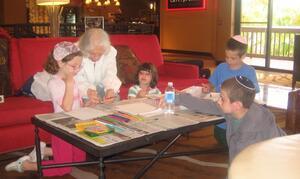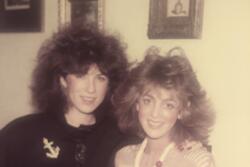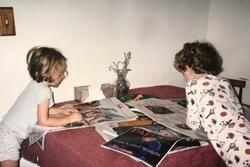My Time on the Line
ENFP. Extraversion, intuition, feeling, perception. Four words that, according to the Myers-Briggs personality test, define me as a person. I was at a teen leadership event when I took the test, and after answering detailed questions about myself and my tendencies, it revealed page after page of why I am the way I am, basically explaining every important decision I'd ever made.
For my whole life I've taken pride in my individuality. Even by the time of my Bat Mitzvah, I was the type of person to see beyond face value. I actually enjoyed prayer, unlike a lot of my peers. I was a nerdy little Jewish kid who wouldn’t shut up about Harry Potter, and I loved myself for it. But after the test, I was just one out of 459,139,687 ENFPs.
The next few months were brutal. I started second guessing every decision I made, fearing I would prove the test right. One by one, it picked off passions and values that I felt composed me as a person. Soon, my Jewish beliefs came under attack as well. I wasn’t able to sit in a Judaic class without doubting my teachers, or to pray without feeling like my words were flying into the wind. I wasn’t able to look at nature and see God. I didn’t know myself in those moments, so I shut off the questions, leaving behind my one quality that I had not yet given up on: my curiosity. I became unbalanced and wondered, what is my purpose?
A few months later, in November of my junior year, I lost my great-grandmother, Eleanor. I didn’t realized how much strength I drew from her until she died. I remember just wanting to tell her how much I appreciated the many hours my siblings and I had spent drawing with her, surrounded by crayons and colored pencils as she sketched us flawlessly. Even though I was young, I could tell that those moments were there for me to hold on to. Losing Grandma El was like losing the one constant I had left after that test, and I came back to the question, what is my purpose?
My hope was that attending Camp Stone for the seventh summer, this time as a staff member, would be a little ray of sunlight through the cloud that had been hanging over me. I was especially excited because my cousin Lielle, from Israel, would be coming to camp for the first time, and I hadn’t seen her in a year. I had the option to learn in a chavruta (two-person study group) with her every Shabbat, so I took that opportunity, seeing it as a way to give over to her all that camp had given to me. That Thursday, I prepared a topic for us to discuss.
During our discussion, she quickly and confidently answered controversial questions I posed to her, and I could see how her train of thought was extremely similar to mine. I pushed a little further and we started talking about aspects of our Judaism that we struggle with. Davening (praying) was difficult, saying the blessing before bread seemed pointless, and as women, it was hard to accept a religion that so often seemed to reject us. I looked at Lielle, and saw in her the scared and confused person I had been earlier that year. It seemed as though she had never asked these questions out loud before, and was looking to me as her lifeline. How could I tell her that I didn’t have the answers to her questions, that, in fact, I was struggling with them myself. What was my purpose in this chavruta if I couldn’t give her answers?
I approached the directors of Jewish learning at camp with my situation and they suggested an article entitled, “What Death Can Teach Us About Life and Living” by Rabbi Abraham Joshua Heschel. The moment I read his words, something clicked.
That Shabbat afternoon, Lielle and I began to read the article. I tried to pace myself before jumping to the line that had opened my eyes: “This is the meaning of existence…to weave the threads of temporality into the fabric of eternity.” When we came to it, Lielle and I simultaneously lifted our eyes from the page. It hit her, just as it had hit me. Together, we came to a deeper understanding of the thought. We concluded that this meant the beginning of finding meaning is understanding that all of humankind is a timeline, and we have an immense responsibility in pointing it toward virtue. How we choose to do so defines our purpose.
I had an idea in that moment of clarity that Lielle was completely on board with. We decided to dedicate our time together to Grandma El. I can only imagine how she would smile so dearly if she knew that her great-granddaughters were learning together, and how she would blush if she knew it was in her name. In a way, Grandma El had helped us heal. It was the first time either of us had talked about her since November.
In that moment, I felt a little sensation of fulfilled purpose. Lielle was able to open up to me. She shared with me questions that she had never wondered out loud. Knowing the potential I could fulfill when I wasn’t distracted by four letters, I decided then that I wouldn’t allow ENFP to distract me from using my time on the line to positively affect the lives of the people around me.
That afternoon, following Shabbat Slow Shira, a time when the entire camp sings slow Jewish songs in unison, I ran to find Lielle. I had seen her crying while we were singing. I knew she wasn't crying out of sadness or happiness, but out of pure emotion. Camp has a way of doing that to you. I caught up with her as we left the dining hall, and hugged her. She looked at me with a huge smile as she pulled away, and told me, “I looked forward to our chavruta every week.”
This piece was written as part of JWA’s Rising Voices Fellowship.







That's my peer editor! Great job, Neima.
Such a beautifully written and thought-provoking piece!
Wow! What a wonderful piece! This really encouraged me to think about the importance of using my time wisely. Thank you for sharing!